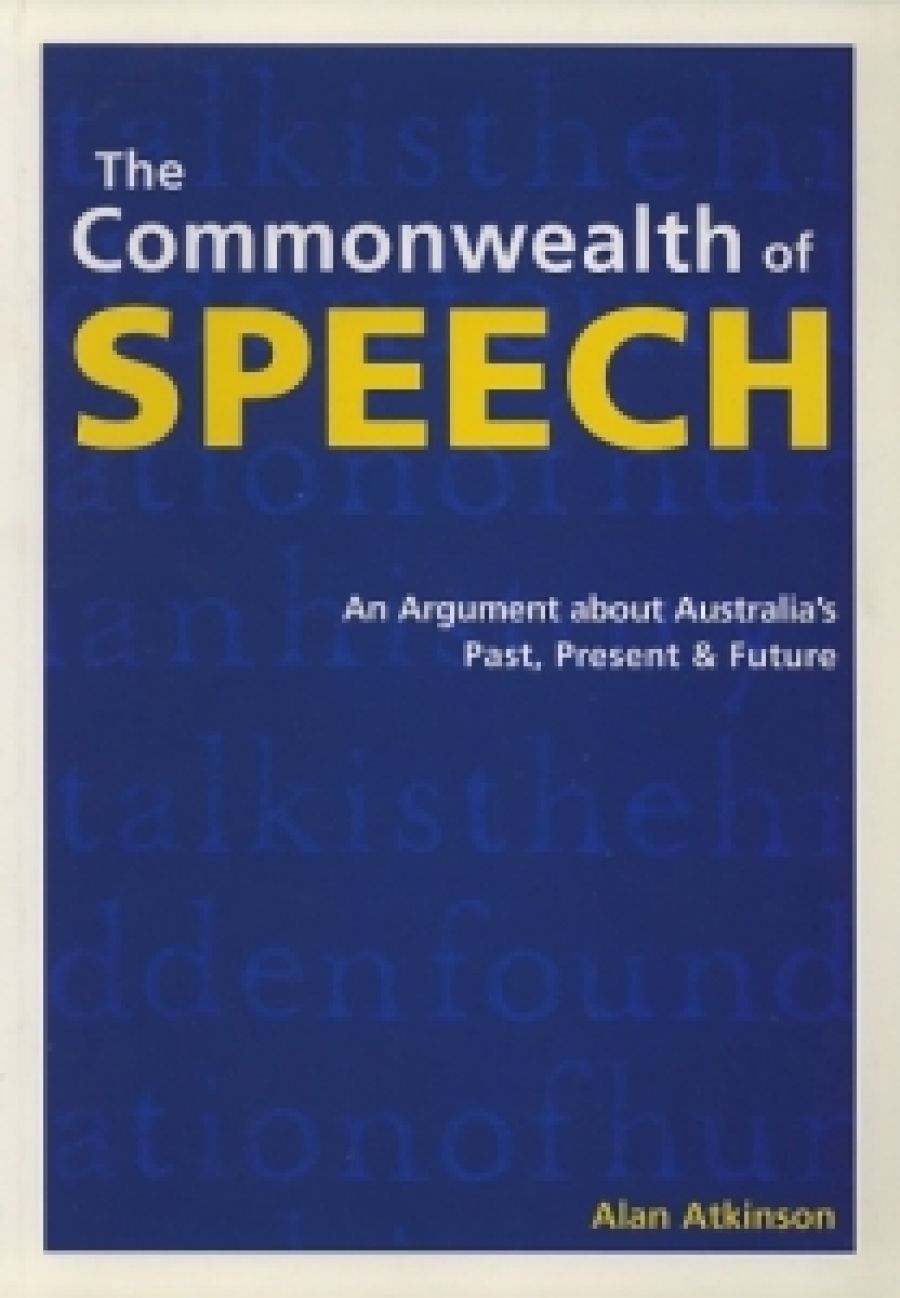
- Free Article: No
- Contents Category: Australian History
- Review Article: Yes
- Online Only: No
- Custom Highlight Text:
According to the back cover: ‘This book explores the way common conversation matters … that during the last two hundred years we have been beguiled by reading and writing. Only during the last part of the twentieth century have we begun to remember the importance of speech as a source of truth in human affairs.’ It could also be noted that the seven essays collected here began as lectures, seminars or articles on such themes as the role of the monarchy in modern Australia (Prince Charles is judged a better speechmaker than his mum, therefore we have hope), the republican movement, the significance of Manning Clark and Henry Reynolds as influential Australian historians, the early nineteenth-century views of Edward Smith Hall and James Macarthur on the rights of Aboriginal people, and Raffaello Carboni’s account of the Eureka Stockade.
- Book 1 Title: The Commonwealth of Speech
- Book 1 Subtitle: An Argument about Australia’s Past, Present and Future
- Book 1 Biblio: Australian Scholarly Publishing, $29.95 pb, 180 pp, 1 74097 004 7
The essays are anchored to a handful of theoretical texts that have appeared since the mid-1990s and retain the slightly preachy style of their origins. Those unhappy creatures known as ‘trained historians’ are castigated for their failure to listen as well as look for evidence and exhorted to become more like novelists. Yet in the final essay, ‘The Commonwealth of Speech’, we are told that history as a ‘single chain of events, as a type of collective growing-up’ is no longer acceptable. We must now adopt ‘History as a performing art … a new means of presenting the past, which is to be found everywhere, not only in the rapidly expanding art of visual and aural presentation – in films, re-enactments and museums – but also in writing itself. All will be better informed by orality.’
In his first essay, Atkinson returns to the arguments he developed at length in The Europeans in Australia (1997) about the role of pens, paper, and the written word in the convict settlement in New South Wales. There is a suggestion running through the whole collection that the differences between black and white Australia could be resolved if only ‘we’ could get over our obsession with written evidence and become more willing to accept the ‘orality’ of Aboriginal society. ‘Some would argue,’ Atkinson says later, ‘that a nation can be seriously changed by the word “Sorry”, spoken out loud with appropriate pomp and circumstance.’ Atkinson’s arguments move between the period 1780–1850 which he knows well, and the present, where he seems more at ease with theory than contemporary Australian history. It is disconcerting, for example, to find Paul Kelly’s influential 1992 account of the demise of ‘the Australian settlement’ in The End of Certainty attributed solely to Greg Melleuish who, in 1998, merely made extensive (though fully acknowledged) use of it.
The oral culture in Atkinson’s mind is an idealised sound bite, derived from ethnohistory. It exists only in certain places and kinds of communities, not in the babble of modern life where talk is being supplanted by SMS text messages on mobile phones or drowned in mechanical din. He is not interested in the real problems posed by contemporary ‘orality’. Edward Smith Hall’s 1820s newspaper The Monitor had barely 250 subscribers. James Macarthur represented a few hundred electors, most of whom he would have spoken to personally. In the early nineteenth century, it was possible for a politician to listen to his constituents and discuss his ideas with them, or for a shopkeeper to persuade his customers of the quality of his goods. For huge numbers over vast areas, radio and television convey the information necessary for our society to function, but they are not good at listening. Today, if listening occurs, it is ritualised through opinion polls or talkback radio. The task of persuasion has been handed over to advertising agencies.
Radio and television are also extremely fragmented in their reach and coverage, as well as self-defeating in the sheer volume of talk they produce, and its ephemeral quality. Nor does Atkinson consider the very real problem of memory, especially in a culture that has long depended on writing things down. Simply consider the different ways in which European written records have enabled Aboriginal people to reconstruct lost sections of their family histories, or the fragility and selectivity of personal memories as one grows older. There are other problems that we know about instinctively, such as the tendency to dramatise or inflate our experience in recounting stories of grievance or luck. In a small society, each individual’s experience is unique; in a mass society, experiences are rarely even statistically significant. Oral cultures need to function on a level of trust that in modern life we can only idealise. Think for a moment of the ‘due diligence’ studies that have replaced the handshake in business transactions, or the paper trail that has become the mainstay of legal redress.
It may not have been Atkinson’s intention to examine these problems. Much of what he writes is yearning for a purer, better, simpler pre-capitalist society. But it is hard not to answer back when being admonished, or when the ways in which historians do use the records of speech are conveniently overlooked. For what else are court records, the evidence of select committees and royal commissions, the parliamentary debates? Undoubtedly, we are being overtaken by the mad rush of modern life, and we would probably all be better off listening more, but pity the poor historian who must not only listen to the babble, and try to make sense of it, but must also go out and ‘perform’ – whatever that means.


Comments powered by CComment